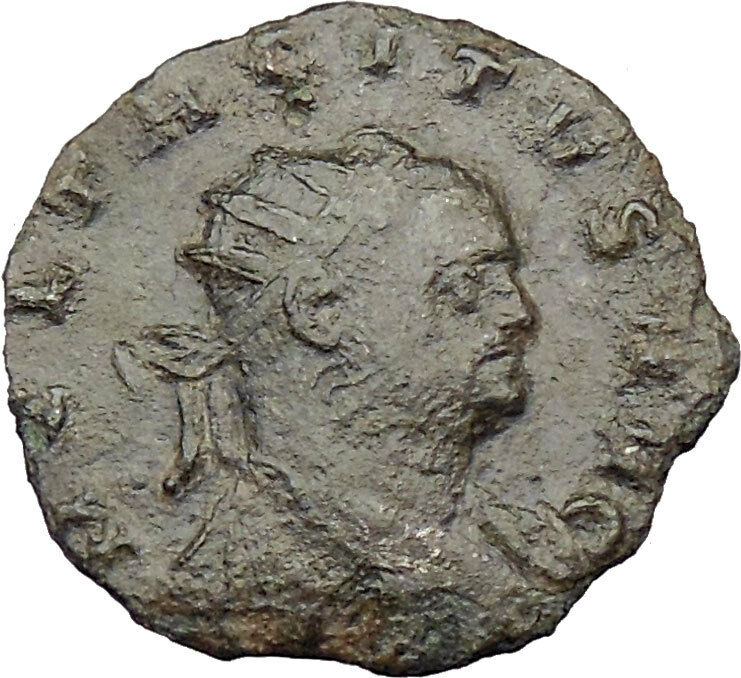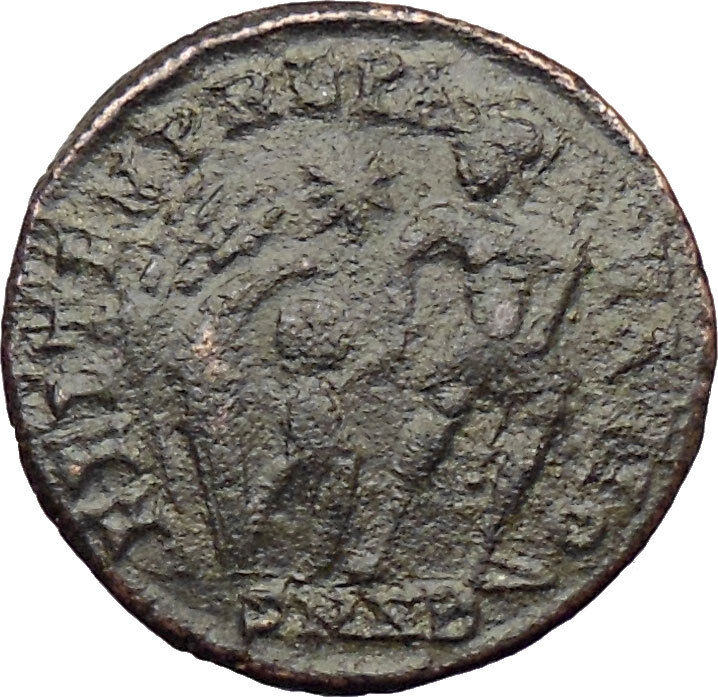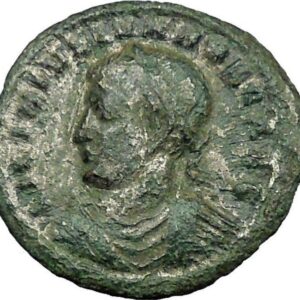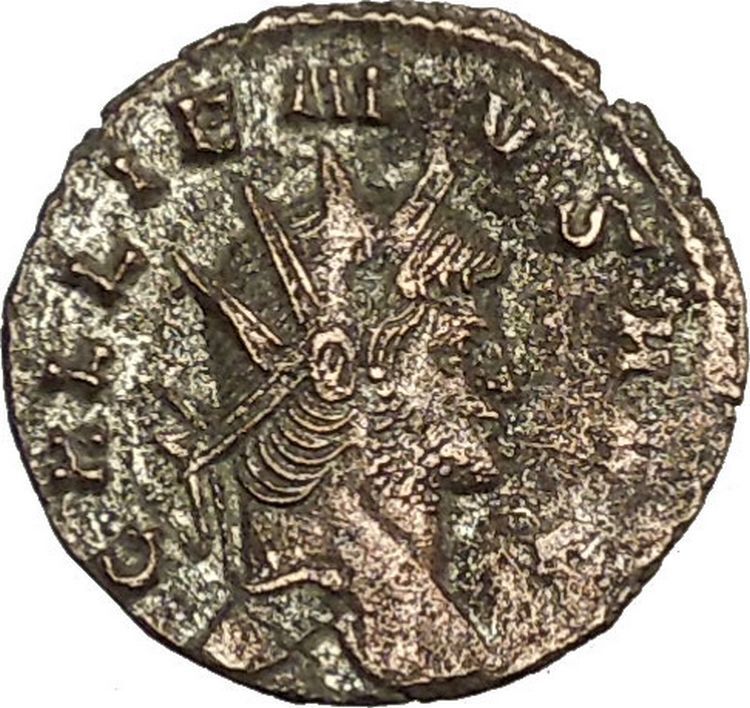|
Caracalla
–
Roman Emperor
: 198-217 A.D. –
Bronze As 24mm (9.91 grams) Struck circa 214-215 A.D.
Reference: RIC 576; Sear 7009; BMC 274, Cohen 540.
ANTONINVS PIVS AVG GERM, laureate, draped and cuirassed bust right
PROVIDENTIA DEORVM S-C, Providentia standing left holding wand over globe
at her feet and sceptre.
You are bidding on the exact item pictured,
provided with a Certificate of Authenticity and Lifetime Guarantee of
Authenticity.
In
Roman mythology
, Providentia was the
goddess
of forethought. Providentia.
(Providence).—-With all their vices, follies, and gross superstitions
(indeed, in spite of them), the Romans still appear to have cherished a
belief in the perpetual and direct interposition of the gods with respect to
human affairs.—-Among the various monuments which attest this religious
feeling, or at leas this profession of religion, on the part of both princes
and people, none are more conspicuous than those to be found on their
imperial coins, for it is to be observed that previous to the
substitution of the monarchical for the republican form of government, that
allegorical divinity whose name is derived from providere (to
foresee) is not seen either on metal or on marble.In
ancient Roman religion
, Providentia
is a divine personification of the ability to foresee and make provision.
She was among the embodiments of
virtues
that were part of the
Imperial cult of ancient Rome
.Providentia
thus figures in
art
, cult, and
literature
, but has little or no
mythology
as such.
Providentia was an important moral and philosophical abstraction
in Roman discourse.
Cicero
says it is one of the three main
components of prudentia, “the knowledge of things that are good or
bad or neither,” along with memoria, “memory,” and intellegentia,
“understanding.” The Latin word is the origin of the Christian concept of
divine providence
.
Imperial cult
Upon the death of
Augustus
, the emperor
Tiberius
established an
altar
to Providentia Augusta in recognition
of “the godhead manifested in his father’s provisions for the
Roman state
.” The cult title
Augusta
was attached also to such goddesses
as
Pax
,
Justitia
, and
Concordia
during the
Imperial era
. Traditional epithets invoked
a deity within a specific functional sphere by declaring their power. The
title Augusta thus fixed the divinity’s force within the sphere of
the emperor as Augustus.
In 28 AD, after Tiberius arrested and executed
Sejanus
for conspiracy, the Cult of Virtues
played a role in the propaganda that presented the restoration of Imperial
order as a return to constitutional government. Sacrifices were offered to
Providentia along with Salus (“Security”),
Libertas
(“Liberty”), and the
Genius
. Providentia at this time also
received a permanent full-time priest (sacerdos)
devoted to her. In the wake of the
Pisonian conspiracy
against
Nero
, religious observances in 59 AD to
repair the state included sacrifices by the
Arval Brethren
to various deities, among
them Providentia.
Providentia appeared on
Roman coins
issued under
Vespasian
,
Trajan
,
Hadrian
,
Antoninus Pius
,
Septimius Severus
,
Commodus
and
Diocletian
. A coin issued by
Titus
depicted his deified father Vespasian
handing a globe to his son as his successor, with the legend Providentia
Augusta. Coins issued by
Nerva
depicted the Genius of the
Senate
handing the globe to the new
emperor, with the legend Providentia Senatus, “the Providence of the
Senate.”
Providentia in
numismatics

The figure of Providentia from a sculpture group in Vienna, as
depicted on an Austrian 100-euro gold coin
Providentia has been the main motif for many collector coins and medals,
the most recent one is the famous
100 euro Sculpture Gold coin
issued on
November 13, 2002. The reverse features the Providentia Fountain (“Provendentia
Brunnen”) in central Vienna, work of one of the greatest baroque sculptor
Georg Rafael Donner
. In the centre of the
coin, the allegorical figure of Providentia with a medallion of the Roman
god,
Janus
, who had two faces, is displayed.
Surrounding the fountain there are other symbolic figures representing
tributary rivers of the
Danube
. Providentia is enthroned high above
the figure of an old man representing the
Enns River
.
Caracalla (Latin:
Marcus Aurelius Severus Antoninus Augustus;4
April 188 – 8 April 217) was
Roman emperor
from 198 to 217 The eldest son of
Septimius Severus
, for a short time he ruled
jointly with his younger brother
Geta
until he had him murdered in 211.
Caracalla is remembered as one of the most notorious and unpleasant of emperors
because of the massacres and persecutions he authorized and instigated
throughout the Empire.
Caracalla’s reign was also notable for the
Constitutio Antoniniana
(also called the
Edict of Caracalla), granting
Roman citizenship
to all freemen throughout the
Roman Empire
, which according to historian
Cassius Dio
, was done for the purposes of
raising tax revenue. He is also one of the emperors who commissioned a large
public bath-house (thermae)
in Rome. The remains of the
Baths of Caracalla
are still one of the major
tourist attractions of the Italian capital.
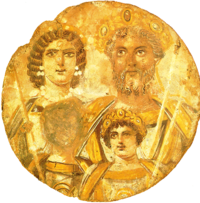
The
Severan Tondo
Early life

|
O:
laureate
draped bust of young Caracalla
ANTONINVS
_AVGVSTVS
|
R:
Felicitas
holding
caduceus
and
cornucopia
FELICI_TAS
AVGG
|
|
silver
denarius
struck in
Rome
200; ref.: RIC 35 |
Caracalla, of mixed
Punic
–Roman
and Syrian
descent, was born Lucius Septimius
Bassianus in Lugdunum
,
Gaul (now Lyon
,
France
), the son of the later Emperor Septimius
Severus and
Julia Domna
. At the age of seven, his name was
changed to Marcus Aurelius Septimius Bassianus Antoninus to create a connection
to the family of the philosopher emperor
Marcus Aurelius
. He was later given the
Caracallanickname
,
which referred to the Gallic hooded tunic he habitually wore and which he made
fashionable.
Reign (211)
Murder of brother
(211)
His father died in 211 at
Eboracum
(now
York) while on campaign in northern Britain. Caracalla was present
and was then proclaimed emperor by the troops along with his brother
Publius Septimius Antoninus Geta
. Caracalla
suspended the
campaign in Caledonia
and soon ended all
military activity, as both brothers wanted to be sole ruler thus making
relations between them increasingly hostile. When they tried to rule the Empire
jointly they actually considered dividing it in halves, but were persuaded not
to do so by their mother.
Then in December 211 at a reconciliation meeting arranged by their mother
Julia, Caracalla had Geta assassinated by members of the Praetorian Guard loyal
to himself, Geta dying in his mother’s arms. Caracalla then persecuted and
executed most of Geta’s supporters and ordered a
damnatio memoriae
pronounced by the Senate
against his brother’s memory.
Geta’s image was simply removed from all coinage, paintings and statues,
leaving a blank space next to Caracalla’s. Among those executed were his former
cousin-wife
Fulvia Plautilla
, his unnamed daughter with
Plautilla along with her brother and other members of the family of his former
father-in-law
Gaius Fulvius Plautianus
. Plautianus had
already been executed for alleged treachery against emperor Severus in 205.
About the time of his accession he ordered the
Roman currency
devalued, the silver purity of
the denarius
was decreased from 56.5% to 51.5%, the
actual silver weight dropping from 1.81 grams to 1.66 grams – though the overall
weight slightly increased. In 215 he introduced the
antoninianus
, a “double denarius” weighing
5.1 grams and containing 2.6 grams of silver – a purity of 52%.
In the Roman provinces
In 213, Caracalla went north to the German frontier to deal with the
Alamanni
tribesmen who were raiding in the
Agri Decumates
. The Romans did defeat the
Alamanni in battle near the river
Main
, but failed to win a decisive victory over
them. After a peace agreement was brokered and a large bribe payment given to
the invaders, the Senate conferred upon him the empty title of Germanicus
Maximus. He also acquired the surname Alemannicus at this time.
The following year the tyrant traveled to the East, to Syria and Egypt never to
return to Rome.
Gibbon
in his work describes Caracalla as “the
common enemy of mankind”. He left the capital in 213, about a year after the
murder of Geta, and spent the rest of his reign in the provinces, particularly
those of the East. He kept the Senate and other wealthy families in check by
forcing them to construct, at their own expense, palaces, theaters, and places
of entertainment throughout the periphery. New and heavy taxes were levied
against the bulk of the population, with additional fees and confiscations
targeted at the wealthiest families.
When the inhabitants of
Alexandria
heard Caracalla’s claims that he had
killed Geta in self-defense, they produced a satire mocking this as well as
Caracalla’s other pretensions. In 215, Caracalla savagely responded to this
insult by slaughtering the deputation of leading citizens who had unsuspectingly
assembled before the city to greet his arrival, and then unleashed his troops
for several days of looting and plunder in Alexandria. According to historian
Cassius Dio, over 20,000 people were killed.[citation
needed]
Domestic Roman policy
Affiliation with
the army
During his reign as emperor, Caracalla raised the annual pay of an average
legionary to 675
denarii
and lavished many benefits on the
army which he both feared and admired, as instructed by his father Septimius
Severus who had told him on his deathbed to always mind the soldiers and ignore
everyone else. Caracalla did manage to win the trust of the military with
generous pay rises and popular gestures, like marching on foot among the
ordinary soldiers, eating the same food, and even grinding his own flour with
them.
With the soldiers, “He forgot even the proper dignity of his rank,
encouraging their insolent familiarity,” according to Gibbon.
“The vigour of the army, instead of being confirmed by the severe discipline of
the camps, melted away in the luxury of the cities.”

|
O:
laureate
head of Caracalla
ANTONINVS
PIVS
AVG
GERM
|
R:
Sol
holding
globe
, rising hand
P M
TR P
_XVIIII
COS
IIII
P P
|
|
silver
denarius
struck in
Rome
216; ref.: RIC 281b, C 359 |
His official portraiture marks a break with the detached images of the
philosopher–emperors who preceded him: his close-cropped haircut is that of a
soldier, his pugnacious scowl a realistic and threatening presence. This rugged
soldier–emperor iconic archetype was adopted by most of the following emperors
who depended on the support of the troops to rule, like his eventual successor
Maximinus Thrax
.
Seeking to secure his own legacy, Caracalla also commissioned one of Rome’s
last major architectural achievements, the
Baths of Caracalla
, the 2nd largest public
baths ever built in ancient Rome. The main room of the baths was larger than
St. Peter’s Basilica
, and could easily
accommodate over 2,000 Roman citizens at one time. The bath house opened in 216,
complete with libraries, private rooms and outdoor tracks. Internally it was
lavishly decorated with gold-trimmed marble floors, columns, mosaics and
colossal statuary.
Edict of
Caracalla (212)
The
Constitutio Antoniniana
(Latin: “Constitution
[or Edict] of Antoninus”) (also called Edict of Caracalla) was an edict
issued in 212 by Caracalla which declared that all free men in the Roman Empire
were to be given full Roman citizenship and all free women in the Empire were
given the same rights as Roman women.
Before 212, for the most part only inhabitants of Italia held full Roman
citizenship. Colonies of Romans established in other provinces, Romans (or their
descendants) living in provinces, the inhabitants of various cities throughout
the Empire, and small numbers of local nobles (such as kings of client
countries) held full citizenship also. Provincials, on the other hand, were
usually non-citizens, although many held the
Latin Right
.
The Roman Historian
Cassius Dio
contended that the sole motivation
for the edict was a desire to increase state revenue.At the time aliens did not have to pay most taxes that were required of
citizens, so although nominally Caracalla was elevating their legal status, he
was more importantly expanding the Roman tax base. The effect of this was to
remove the distinction that citizenship had held since the foundation of Rome
and as such the act had a profound effect upon the fabric of Roman society.[16]
War with Parthia
According to the historian Herodian, in 216, Caracalla tricked the Parthians
into believing that he accepted a marriage and peace proposal, but then had the
bride and guests slaughtered after the wedding celebrations. The thereafter
ongoing conflict and skirmishes became known as the
Parthian war of Caracalla
.
Assassination (217)
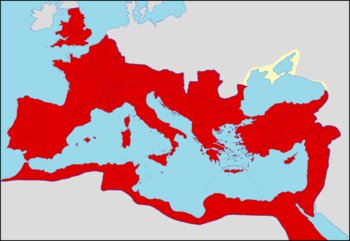
The Roman Empire during the reign of Caracalla.
While travelling from
Edessa
to continue the war with
Parthia
, he was assassinated while urinating at
a roadside near
Carrhae
on 8 April 217 (4 days after his 29th
birthday), by Julius Martialis, an officer of his personal bodyguard.
Herodian
says that Martialis’ brother had been
executed a few days earlier by Caracalla on an unproven charge; Cassius Dio, on
the other hand, says that Martialis was resentful at not being promoted to the
rank of centurion. The escort of the emperor gave him privacy to relieve
himself, and Martialis then ran forward and killed Caracalla with a single sword
stroke. While attempting to flee, the bold assassin was then quickly dispatched
by a Scythian archer of the Imperial Guard.
Caracalla was succeeded by his
Praetorian Guard Prefect
,
Macrinus
, who (according to Herodian) was most
probably responsible for having the emperor assassinated.
His nickname
According to
Aurelius Victor
in his Epitome de Caesaribus,
the agnomen
“Caracalla” refers to a Gallic
cloak
that Caracalla adopted as a personal
fashion, which spread to his army and his court.
Cassius Dio
and the
Historia Augusta
agree that his nickname was derived from his cloak, but do not mention its
country of origin.
Legendary king of
Britain
Geoffrey of Monmouth
‘s legendary
History of the Kings of Britain
makes
Caracalla a king of Britain, referring to him by his actual name “Bassianus”,
rather than the nickname Caracalla. In the story, after Severus’s death the
Romans wanted to make Geta king of Britain, but the Britons preferred Bassianus
because he had a British mother. The two brothers fought a battle in which Geta
was killed and Bassianus succeeded to the throne. He ruled until he was betrayed
by his Pictish
allies and overthrown by
Carausius
, who, according to Geoffrey, was a
Briton, rather than the historically much later
Menapian
Gaul that he actually was.
|










